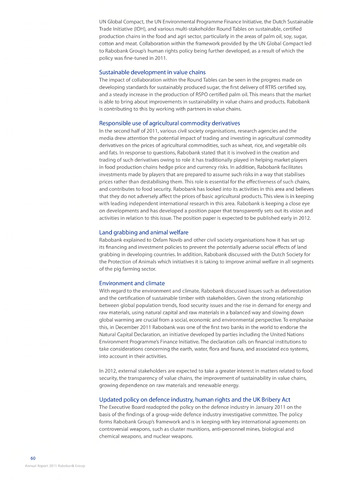UN Global Compact, the UN Environmental Programme Finance Initiative, the Dutch Sustainable
Trade Initiative (IDH), and various multi-stakeholder Round Tables on sustainable, certified
production chains in the food and agri sector, particularly in the areas of palm oil, soy, sugar,
cotton and meat. Collaboration within the framework provided by the UN Global Compact led
to Rabobank Group's human rights policy being further developed, as a result of which the
policy was fine-tuned in 2011
Sustainable development in value chains
The impact of collaboration within the Round Tables can be seen in the progress made on
developing standards for sustainably produced sugar, the first delivery of RTRS certified soy,
and a steady increase in the production of RSPO certified palm oil. This means that the market
is able to bring about improvements in sustainability in value chains and products. Rabobank
is contributing to this by working with partners in value chains.
Responsible use of agricultural commodity derivatives
In the second half of 2011various civil society organisations, research agencies and the
media drew attention the potential impact of trading and investing in agricultural commodity
derivatives on the prices of agricultural commodities, such as wheat, rice, and vegetable oils
and fats. In response to questions, Rabobank stated that it is involved in the creation and
trading of such derivatives owing to role it has traditionally played in helping market players
in food production chains hedge price and currency risks. In addition, Rabobank facilitates
investments made by players that are prepared to assume such risks in a way that stabilises
prices rather than destabilising them. This role is essential for the effectiveness of such chains,
and contributes to food security. Rabobank has looked into its activities in this area and believes
that they do not adversely affect the prices of basic agricultural products.This view is in keeping
with leading independent international research in this area. Rabobank is keeping a close eye
on developments and has developed a position paper that transparently sets out its vision and
activities in relation to this issue.The position paper is expected to be published early in 2012.
Land grabbing and animal welfare
Rabobank explained to Oxfam Novib and other civil society organisations how it has set up
its financing and investment policies to prevent the potentially adverse social effects of land
grabbing in developing countries. In addition, Rabobank discussed with the Dutch Society for
the Protection of Animals which initiatives it is taking to improve animal welfare in all segments
of the pig farming sector.
Environment and climate
With regard to the environment and climate, Rabobank discussed issues such as deforestation
and the certification of sustainable timber with stakeholders. Given the strong relationship
between global population trends, food security issues and the rise in demand for energy and
raw materials, using natural capital and raw materials in a balanced way and slowing down
global warming are crucial from a social, economic and environmental perspective.To emphasise
this, in December 2011 Rabobank was one of the first two banks in the world to endorse the
Natural Capital Declaration, an initiative developed by parties including the United Nations
Environment Programme's Finance Initiative. The declaration calls on financial institutions to
take considerations concerning the earth, water, flora and fauna, and associated eco systems,
into account in their activities.
In 2012, external stakeholders are expected to take a greater interest in matters related to food
security, the transparency of value chains, the improvement of sustainability in value chains,
growing dependence on raw materials and renewable energy.
Updated policy on defence industry, human rights and the UK Bribery Act
The Executive Board readopted the policy on the defence industry in January 2011 on the
basis of the findings of a group-wide defence industry investigative committee. The policy
forms Rabobank Group's framework and is in keeping with key international agreements on
controversial weapons, such as cluster munitions, anti-personnel mines, biological and
chemical weapons, and nuclear weapons.
60
Annual Report 2011 Rabobank Group

